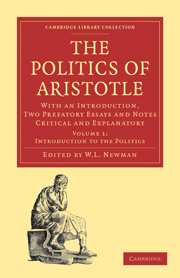Introduction to the Politics, Pages 202-398
Published online by Cambridge University Press: 07 September 2011
Summary
The Greeks were probably far more open-handed in their use of property than the Romans of the Republic. Polybius, at any rate, after describing the munificence of Scipio, adds (32. 12)—‘now an act of this kind would be not unreasonably thought noble everywhere, but at Rome it was positively marvellous, for there no one of his free will gives any one anything whatever belonging to him.’ Not every rich Athenian, indeed, like Cimon, threw his fields and gardens open to the passer-by, and allowed all men freely to take of their produce, or kept open house, or gave the garments from the backs of his slaves to poor men whom he met in the streets—far from it—but many gave dowries to the daughters of impoverished citizens, or paid funeral expenses, or ransomed captives, or subscribed to ἔρανοι for the relief of friends in distress. Aristotle would probably find as much to amend in the methods of the private charity of his day as he did in those of its public charity (8 (6). 5. 1320 a 29 sqq.): still he gives high praise to the liberality with which the Spartans treated each other, and the rich of Tarentum treated the poor (1320 b 9 sqq.: 2. 5. 1263 a 30 sqq.). He demands, however, of his ideal proprietor far more than this.
- Type
- Chapter
- Information
- Politics of AristotleWith an Introduction, Two Prefatory Essays and Notes Critical and Explanatory, pp. 202 - 398Publisher: Cambridge University PressPrint publication year: 2010First published in: 1887

